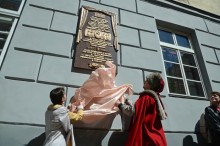The event was initiated by the theater studies and acting art program of culture and arts department at Lviv Franko National University. The program’s head is Shevchenko Prize winner, People’s Artist of Ukraine, actor and director of the Zankovetska Theater Bohdan Kozak. It was held as part of the “Art Arsenal of Good Deeds” project, launched by Lviv Oblast State Administration (LOSA)’s department for culture, nationalities and religions. The event was funded via charity drive Epiphany Apple Tree-2014, The Day learned at the LOSA. The commemorative plaque was created by People’s Artist of Ukraine Vasyl Yarych, who, as Kozak told The Day, waived his entire fee to allow the glorious project to proceed.
The plaque has been installed permanently on the front of the former National House at 22 Teatralna Street, near the Zankovetska Theater. Its opening was held on May 5, exactly 150 years from May 5, 1864, when the National House’s stage saw Ukraine’s first performance of Taras Shevchenko’s drama Nazar Stodolia. Thus, one can say that the grand opening of the commemorative plaque became an organic element of the Bard of Ukraine’s 200th anniversary program.
“When the first Ukrainian theater, founded by the Ruska Besida, was launched in Lviv on March 29, 1864, it was a major event for the entire theatrical culture of Ukraine,” Kozak believes. “The theater’s first performance was Marusia, a play inspired by Hryhorii Kvitka-Osnovianenko’s novel of that name, while May 5 saw Ukraine’s first performance of Shevchenko’s Nazar Stodolia. It entrenched the Galicians’ orientation towards the Dnipro Ukraine, the drama, Ukrainian language and Ukrainian mentality, which the theater remained true to throughout its history, serving as a sign of unity of Galicia, the Dnipro Ukraine, and the Sloboda Ukraine. It hired Marko Kropyvnytsky, Mykola Sadovsky, and Maria Zankovetska. The theater has trained a galaxy of famous actors, including Les Kurbas, Amvrosii Buchma, Marian Krushelnytsky, Yosyp Hirniak, and Sofia Fedorcheva, who then moved to Eastern Ukraine and remade Ukrainian ethnographic theater into a modern, avant-garde theater, known throughout Europe. So, this is an important fact which indicates that we are one nation. The opening of the memorial plaque is our proof that the Muses do not fall silent even amid thundering cannon. By the way, as correctly pointed out by Shevchenko Prize winner, artistic director of the Zankovetska Theater Fedir Stryhun in his speech at the ceremony, the National House in Lviv was funded by grassroots effort, involving small donations coming from all over Galicia, so that there was a center of Ukrainian language, Ukrainian culture, our national identity and integrity. This spring must not be silted or extinguished – on the contrary, it must develop further. Our young people should be aware of this tradition and be proud of the people who worked on this stage, and follow in their steps by serving the nation, cherishing its language, understanding the needs of the day, and being patriots.”







